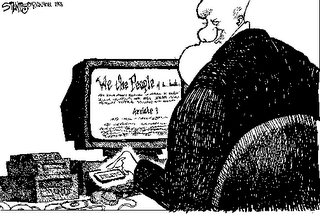
Our democratic form of government depends upon a knowledgeable and engaged citizenry. We don't have one.
The Annenberg Center reports:
The American public is woefully ignorant of basic facts about the Constitution. Although two-thirds of adults say they can name the three branches of government, only one-third actually can. One-third cannot name any of the branches.
The Annenberg survey also reveals a large gap in the public’s awareness of other constitutional fundamentals. For example:
• Over one-third (38 percent) of American adults thinks it is okay for the president to ignore a Supreme Court ruling if the president believes the ruling will prevent him from protecting the country against terrorist attacks.
• Only a bare majority (53 percent) correctly says that Supreme Court justices usually provide written reasons for their decisions. The remainder of the public said the justices do not usually issue written opinions (18 percent) or did not know (29 percent).
The survey results are particularly noteworthy because a large majority of the American public (79 percent) says they believe that understanding the purpose and role of this nation’s court system is very important if not essential.
While nearly three-quarters of those surveyed give themselves passing grades in civics, about half feel their friends and neighbors are uninformed about the role of the judiciary.
More than one-third of Americans (36 percent) say they do not know any of the branches or cannot correctly name any of them.
As might be expected, the familiarity with the branches of government increases with education. Over one-half of Americans with at least a college degree (58 percent) are able to correctly name all three branches. Of those with less than a college education, only 24 percent could identify the three branches. By contrast, 12 percent of college-educated Americans cannot name any of the branches; 45 percent of those with less education were unable to name any of the branches.
Americans ages 18 to 29 are more knowledgeable about the three branches than Americans 65 and older. There are few variations by gender or political affiliation.
One of the most surprising aspects of the survey was the minimal level of public support for the notion that the president must accede to a ruling by the Supreme Court if he disagrees with that ruling.
A bare majority (53 percent) holds that a president must follow a Supreme Court ruling regardless of circumstances and even if he believes that the ruling will prevent him from protecting the country from terrorist attack.
In response to another question, 58 percent believe that if the president disagrees with a Supreme Court ruling, he should follow that ruling rather than do what he thinks is in the country’s best interest.
Many Americans are not aware that the Supreme Court usually issues written reasons for its decisions – a critical check on the functions of government as well as a road map detailing the legal philosophies of the nine justices.
As Justice Anthony Kennedy explained in the 2006 Sunnylands DVD “A Conversation on the Constitution: Judicial Independence,” “We’re checked by the fact that we have to give reasons for what we do. We have to justify them to our colleagues and to other courts. We have to convince the legal community, the American community that this is right so that they will follow the law.”
Just over half of the public (53 percent) says the justices usually give written reasons for their decisions, but almost as many (47 percent) say that court members do not have to supply any explanation (18 percent), or say that they do not know (29 percent).
Again, education plays a factor. Three-quarters of the Americans with at least some graduate school training or college education say the justices typically give written opinions. Among those with some college or technical school experience, the number drops to 53 percent, and to 41 percent for those with a high school education or less.
People who could name all three branches of government also are more likely to say justices usually issue reasons for their rulings. Sixty percent of those who could name only two branches of government said justices usually issue written opinions; among those who could name only one branch, 48 percent, and no branches, 33 percent.
Suggestions for what the ordinary citizen might do to change this:
As part of an ongoing effort to enhance civics awareness and understanding and mark the second annual observance of Constitution Day, the Annenberg Foundation Trust at Sunnylands this year is distributing more than 60,000 DVDs to high schools and libraries across the country to help them plan appropriate programming. These include a new video with Justices Sandra Day O’Connor, Anthony Kennedy and Stephen Breyer discussing judicial independence with high school students, and a 2005 video with Justices O’Connor and Breyer speaking about the Constitution. Additional learning materials are also available at www.annenbergclassroom.org and www.justicelearning.org.
With these materials, now might be a good time for civic-minded citizens to initiate `Good Citizenship' programs in their local community centers, or take the program to the people, with lunch hour shows where people congregate.
Technorati Tags: Technorati Tag, Technorati Tags, tags, categories, citizenship, Supreme Court, USSC, Annenberg Center, Annenberg, Constitution, The Constant American, Constant American

No comments:
Post a Comment